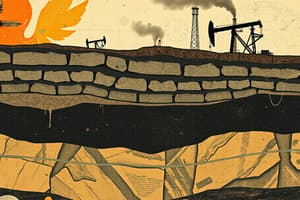Podcast
Questions and Answers
What is the process of conversion of dead vegetation into coal called?
What is the process of conversion of dead vegetation into coal called?
carbonisation
What are the characteristics of coke?
What are the characteristics of coke?
Coke is a tough, porous, and black substance, and is an almost pure form of carbon.
What are natural resources?
What are natural resources?
Substances present on the earth that allow the existence of life and satisfy the needs of living organisms.
What is the difference between exhaustible and inexhaustible natural resources?
What is the difference between exhaustible and inexhaustible natural resources?
How was coal formed?
How was coal formed?
What is the significance of coke in the extraction of metals?
What is the significance of coke in the extraction of metals?
What is the role of coke in the manufacture of steel?
What is the role of coke in the manufacture of steel?
Give an example of an inexhaustible natural resource.
Give an example of an inexhaustible natural resource.
What is the main reason why fossil fuels are considered exhaustible natural resources?
What is the main reason why fossil fuels are considered exhaustible natural resources?
What are the advantages of using CNG and LPG as fuels?
What are the advantages of using CNG and LPG as fuels?
What are the characteristics of coal tar?
What are the characteristics of coal tar?
How is petroleum formed?
How is petroleum formed?
What is the process of refining of petroleum?
What is the process of refining of petroleum?
What is a characteristic of natural gas?
What is a characteristic of natural gas?
What is the role of high temperature and pressure in the formation of coal?
What is the role of high temperature and pressure in the formation of coal?
What is one of the uses of coal tar?
What is one of the uses of coal tar?
Study Notes
Carbonisation and Coal
- Carbonisation is the slow process of converting dead vegetation into coal, which mainly contains carbon.
- Coke is a tough, porous, and black substance that is an almost pure form of carbon.
- Uses of coke: manufacturing steel, extracting metals, and as a fuel.
Natural Resources
- Natural resources are substances present on the earth that allow the existence of life and satisfy the needs of living organisms.
- Inexhaustible natural resources: unlimited quantity, not likely to be exhausted by human activities (e.g., sunlight, air, and water).
- Exhaustible natural resources: limited quantity, likely to be exhausted by human activities (e.g., forests, wildlife, minerals, coal, petroleum, and natural gas).
Formation of Coal
- Coal was formed around 300 million years ago from dense forests in low-lying wetland areas.
- Natural processes like flooding buried these forests under soil, compressing them, and increasing temperature.
- Under high temperature and pressure, dead plants converted into coal.
Fossil Fuels
- Fossil fuels require millions of years to form from dead plants and animals.
- Amount of fossil fuels in nature is limited, making them exhaustible resources.
Advantages of CNG and LPG
- CNG and LPG can be burnt directly and easily transported through pipelines.
- They have higher calorific value than other fuels and are cleaner fuel, burning without smoke.
Coal Tar
- Coal tar is a thick, black liquid with an unpleasant smell and a mixture of about 200 carbon compounds.
- Uses of coal tar: making synthetic dyes, drugs, explosives, perfumes, plastics, paints, and roofing materials.
Formation of Petroleum
- Petroleum was formed from organisms living in the sea, which settled at the bottom and got covered with layers of sand and clay.
- Over millions of years, dead organisms converted into petroleum and natural gas under high pressure and temperature.
- Petroleum and natural gas get trapped between two layers of rocks, with natural gas collecting above petroleum under high pressure.
Refining of Petroleum
- Refining of petroleum is the process of separating various constituents or fractions of petroleum.
Studying That Suits You
Use AI to generate personalized quizzes and flashcards to suit your learning preferences.
Related Documents
Description
Quiz on Chapter 3 of 8th class Science, covering topics related to coal and petroleum, including carbonisation and characteristics of coke.




